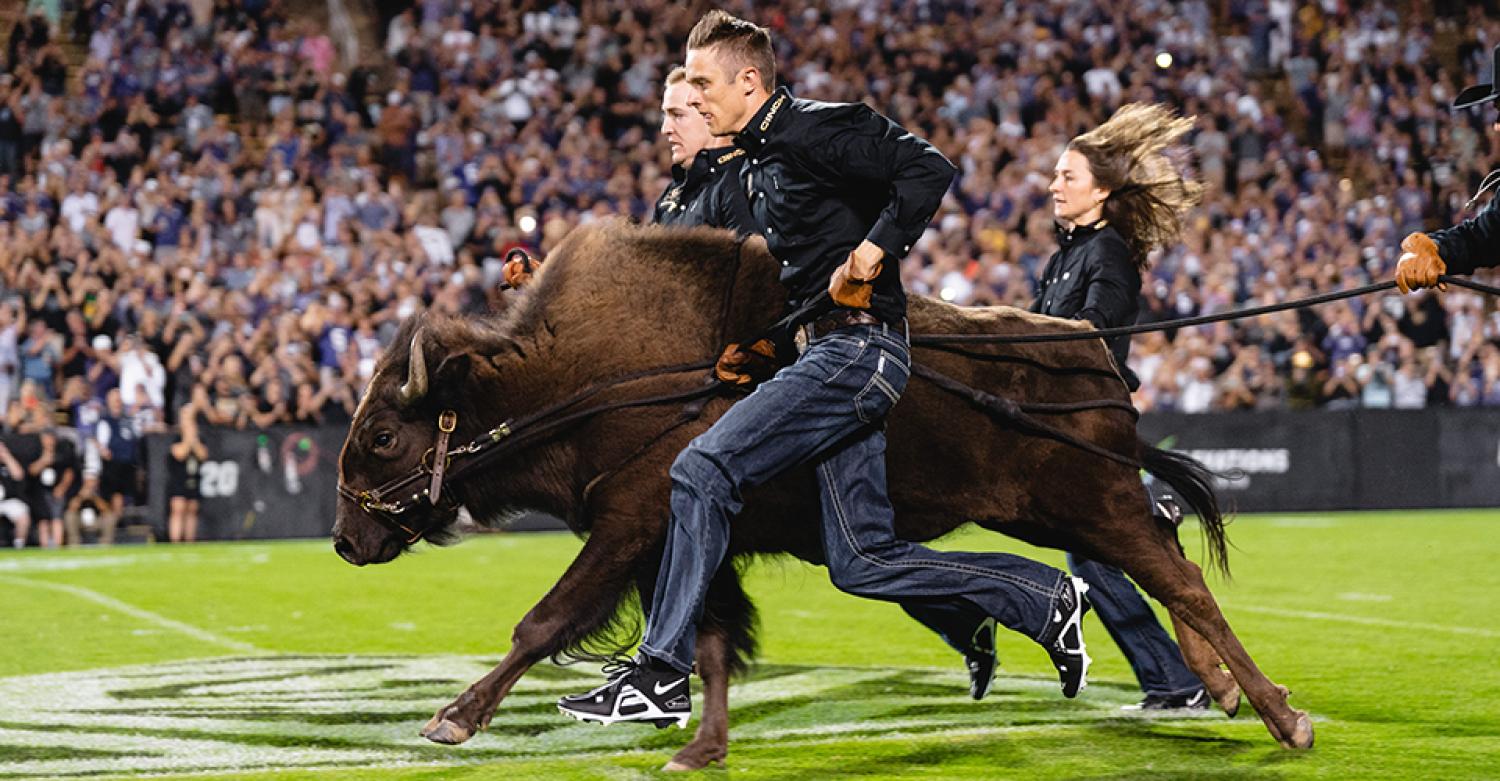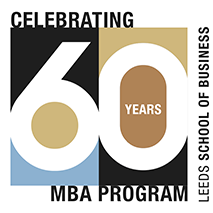‘Here Comes Ralphie,’ From Folsom Field to Leeds Résumés

Handlers past and present reflect on the unique set of professional skills they developed caring for the NCAA’s most famous mascot.
Wes Weber, in the foreground, runs with Ralphie VI in the buffalo’s second season with CU Boulder. Weber said the opportunity for an extra year with the Ralphie handler program played a role in doing his master’s right after completing his undergrad. ‘Especially being an older member of the team, I’ve learned how to earn respect from people, while also teaching,’ he says. (Photos courtesy CU Athletics Department)
If you ask most professionals what lessons can be learned from running with a 1,200-pound buffalo, “stay out of the way” will probably top the list.
Most professionals, though, have never been Ralphie handlers.
Handlers are CU Boulder student-athletes who lead the university’s live mascot onto the field before and during home football games. And while their daring dash looks, from afar, like a pell-mell of flying hooves, lost hats and general pandemonium, runs are a game of strategy built on trust, teamwork, communication and leadership.
In other words, it’s a perfect internship for the bold.
“It teaches you so many incredible lifelong skills—teamwork, communication, preparation, the ability to think on your feet, how to coach and be coached,” said Blake Gouin (Fin’14). “Being selected to the program was arguably one of the best things to ever happen to me.”
Taylor Stratton (EBio, EnvSt, Geog’13) ran with Ralphie during her student days. Today, she manages the program, giving her both a personal and professional lens on the benefits of being a handler.
“The biggest and most important member of our team doesn’t speak English,” Stratton said. “So we have to communicate and problem solve in ways that she understands, which forces you to think creatively.
“But you also learn to accept that some things are outside your control, and know when to adapt and pivot to come at a problem from a different angle.”
With Homecoming set for this weekend, Leeds alumni and students talked about the Ralphie handler program and how lessons from being part of the team influenced them as young professionals.
‘You never really leave the Ralphie program’
The Milinazzo brothers help lead Ralphie V onto the field. Chris and Ryan were teammates on the field; today, they continue to work together as colleagues in the financial advisory practice their mother started.
Walk the hallways of Hadad-Milinazzo Financial Group’s offices, in Glendale, and you’ll quickly spot which spaces belong to Chris and Ryan Milinazzo. Both have gigantic photos of Ralphie handlers in action, sprinting downfield with Blackout, the fifth Ralphie at the university.
The brothers—now colleagues in the business their mother started three decades ago—spent time on their grandfather’s ranch in Trinidad growing up, so were comfortable around animals. But Ralphie is a whole different animal.
“For us, it was really the people side of it,” said Chris Milinazzo (Fin’13), a financial advisor at the company. “A lot of incredible athletes showed up to try out, and they weren’t all chosen because it’s not just about being athletic. To some extent, you’re the face of CU athletics.”
Chris described arriving in Boulder as a challenging transition, from a small high school to a sprawling campus.
“I could have gone one of two ways, and the Ralphie program set down guardrails that helped me develop, taught me to communicate and help me find confidence in myself,” he said.
MORE: From Scholarships to Relationships: How Giving Helps Alumni Create Impact
Like most younger brothers, Ryan Milinazzo (Acct’15; MS’16) was watching Chris closely as he started out at college. In fact, seeing his older brother’s experience as a handler pushed Ryan to try out as a high school senior.
“He was always a driven person—he doesn’t just go half in, it’s always 100 percent,” said Ryan, a CPA who serves as a tax advisor and wealth manager at Hadad Milinazzo.
Ryan didn’t qualify for the program until he enrolled at CU. The interview process truly stuck with him—only a handful of students are selected from dozens of qualified applicants each year.
“The interview process was the most rigorous and intense I’ve ever taken part in,” he said, involving pointed questions from not only the coaches, but the graduating seniors. “They’re not looking for you to say the right thing, they’re looking for someone who’s genuine. It’s like a job interview in that you’re not there to impress so much as you are to say, ‘I want to be part of something bigger.’”
And in the choreographed ballet that is the charge downfield, Ryan also saw that you can’t just be a specialist when you’re part of a team.
“I could have gone one of two ways, and the Ralphie program set down guardrails that helped me develop, taught me to communicate and help me find confidence in myself.”
Chris Milinazzo (Fin’13), financial advisor, Hadad-Milinazzo Financial Group
“Every single person running the buffalo has a job, and you have to know what to do if a particular person falls,” he said. “So I don’t just learn my job; I try to understand the bigger picture of being part of a team at work, and knowing how to step in when the occasion demands it.”
Both brothers said the program gave them networks for life, while continuing to sharpen their abilities to connect with people—vital in their work right now, which involves a lot of reassuring clients during turbulent times in the market.
“You graduate from the Ralphie program, but you never really leave the Ralphie program,” Chris said. “You’re surrounded by all these driven, motivated, polished people who make you better. And the people that come out of the program pour back into it, because they realize how much impact it had on their development.”
Confronting uncertainty and change
The plan for Wes Weber was always to get a graduate degree. And while the opportunity to do a fourth season as a handler wasn’t the reason he re-enrolled right after graduation, it wasn’t not the reason, either.
“When I was looking at schools, I didn’t really have a plan B,” said Weber (Mktg, BA’22; MSBA’23). “The goal was to attend Leeds and be a Ralphie handler.”
Weber’s time at Leeds, though, coincided with a pandemic that sidelined football, the retirement of Blackout and the debut of Ember, better known as Ralphie VI.
“It really taught me how to be adaptable, and made me a better teammate,” Weber said. “When the pandemic canceled games, and when Ralphie V retired, it was like, we can’t train, we can’t practice—what are we doing here? But it was a valuable lesson about staying committed to your team and knowing the work we’re putting in now will pay off—if not for us, then for teammates in the years to come.”
He also learned how to onboard and orient people—not to mention a buffalo.
“Especially being an older member of the team, I’ve learned how to earn respect from people, while also teaching,” Weber said. “Communication, being able to listen, is a huge part of being a professional.”
It goes without saying that time management also is an important part of his learning, as he balances being a handler with grad school and the job search, not to mention two internships he completed as an undergrad. Now, as he goes on interviews, Weber is drawing on the confidence he developed as a runner.
“When you’re in the public eye like this, you learn to focus and perform under pressure, he said. “When I walk in the room—whether in class or an interview—I know I can hold my own, and feel like I belong there.”
Born to run
Blake Gouin says coming into sales for medical devices with no healthcare experience was a lot like being selected as a handler. ‘No one has experience running a buffalo,’ he says. ‘You have to coach them how to do it’—exactly what he’s doing now at work. Immediately next to Ralphie are Gouin, left, and Ryan Milinazzo.
Coaching is important in the Ralphie program—so why not bring in a coach to be part of the process?
Blake Gouin ran track and played football at Boulder High School, and when he accepted his offer from Leeds, his track coach invited him to volunteer and help coach the team while he was at college.
“So not only was I getting this leadership experience, I was able to train with the team—which was helpful with tryouts to the Ralphie program, because they’re so selective,” said Gouin, a medical sales representative with Abbott, a life sciences specialist.
“You come into the Ralphie program and no one has experience running a buffalo. You have to coach them on how to do it,” he said. “Same with my job—I’m doing sales in the medical field, coming in with very little experience in medical devices, and now I’m coaching people on how to work in this industry. So understanding peoples’ learning and coaching styles while being able to adapt was an important skill I learned.”
Gouin described his work as consultative sales: He works with physicians, nurses and patients in explaining his company’s medical devices, which are designed for cardiac care.
“There are actually a ton of similarities between my responsibilities with the program and what I do today.”
Blake Gouin (Fin’14), medical sales representative, Abbott
“You don’t have the same conversation twice,” he said. “Whenever I talk to a physician, it is an extremely high-level conversation about a patient’s background or Abbott’s specific product functionality. Whereas patient education is typically centered around pre-procedure processes and follow-up years later.”
Those communication skills are something he polished working with Ralphie. Depending on the event, handlers might be showing the buffalo to small children, the university chancellor or an ESPN reporter. There’s also plenty of communication during and after a run, as the team looks to correct mistakes or share lessons.
“There’s so much strategy that goes into a run—a lot of communication, preparation and practice—and I wasn’t really expecting that,” Gouin said.
He also didn’t expect he’d be able to draw a line between caring for Ralphie and his work of helping patients lead more fulfilling lives.
“I wondered what we were going to talk about, when you asked about Ralphie and my job,” he said. “Now that we’re talking about it, I realize there are actually a ton of similarities between my responsibilities with the program and what I do today.”







